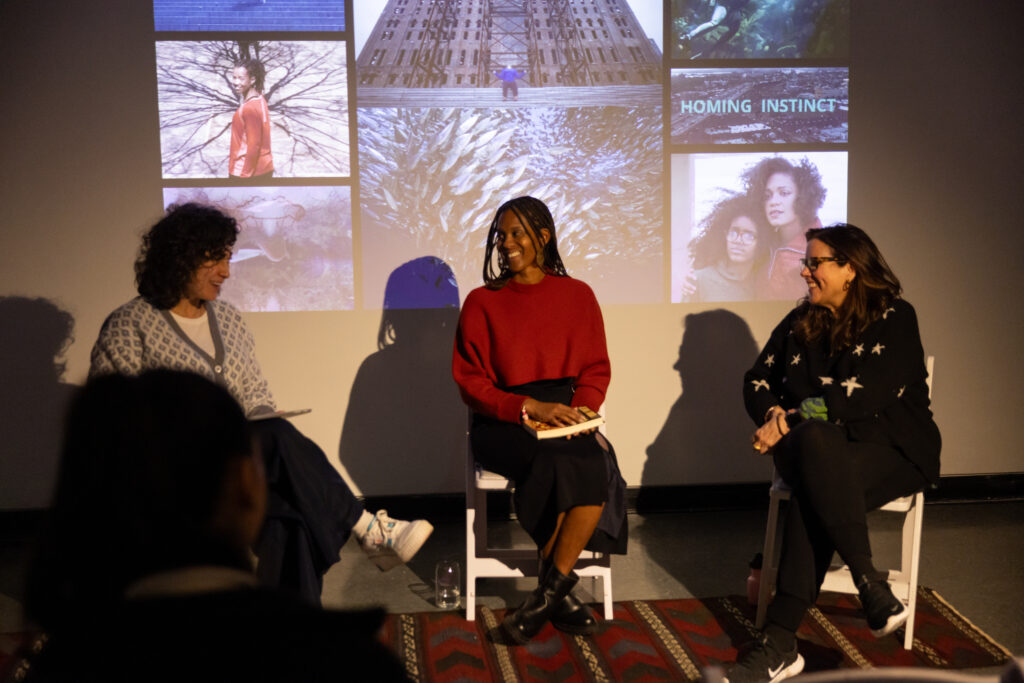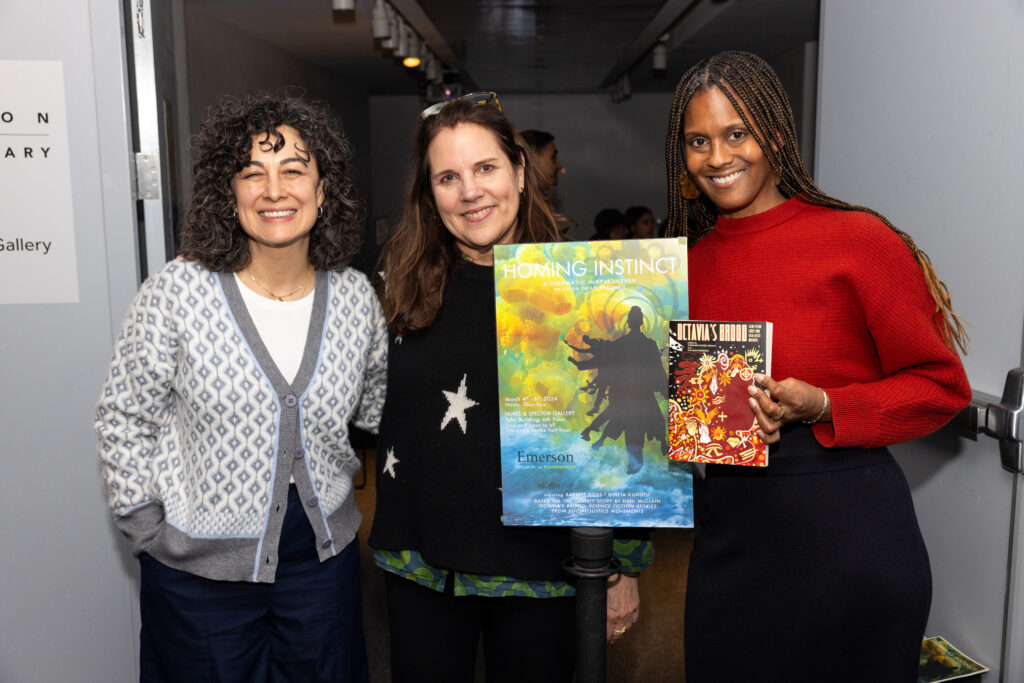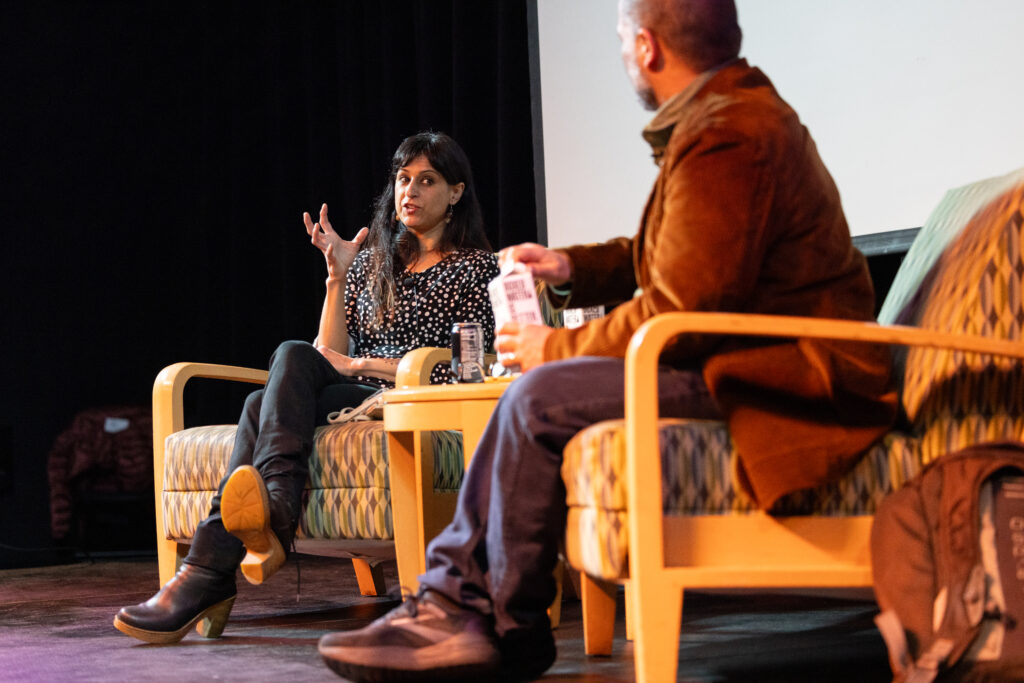Teach-In on Sustainability Panels Look at End-of-Life Care and Sci-Fi Stories
This article was co-written by Emma Siebold ’27 and Paul Raglow-DeFranco, MA ’25
Sustainability affects many aspects of our world, from the hard discussions about end-of-life decisions, to science fiction stories depicting apocalyptic scenarios.
Those two very different topics were discussed in separate events during Emerson’s Teach-In on Sustainability.

Where Will Home Be If Rising Sea Levels Force Us to Move?
Filmmaker Lydia Dean Pilcher was the keynote speaker for the Teach-In on Sustainability, and later participated in a panel about Homing Instinct, her 28-minute climate film installation based on a short story by Dani McClain from the anthology Octavia’s Brood: Science Fiction Stories from Social Justice Movements. McClain also joined the conversation, which was moderated by Journalism Assistant Professor and filmmaker Lina Geraldo.
Pilcher said she worked in collaboration with McClain to create the short film, which follows two friends as they face an order to evacuate New York City because of rising sea levels. The installation was on display in the Huret & Spector Gallery throughout the three days of the Teach-In for everyone to see.
While the anthology was published in 2015, McClain said it has had a “resurgence” since the pandemic. McClain said she felt that, as a journalist, she left gaps in the story, and Pilcher filled those gaps in the film.
“I see her as a mentor,” McClain said. “I am eager to understand what some options are outside of the writing that I’ve done. I do feel like I’m at a point where I’m really interested in the questions that are bigger than the who, what, when, where and why.”

In the movie, oil-dependent travel is limited to 20 miles a month per person, forcing people to locate somewhere and stay. It brings up many questions about where home is and what it means for different people.
“When you think of home and family, the older I get the more considerate I am about who I love,” Pilcher said. “It’s more about who sustains me intellectually and creatively. I could not live long in this climate-altered world without creativity. That’s why film and TV has so much cultural impact – we’re looking to escape or be inspired or learn something.”
Talking Compassionately About Suffering and Life’s End

Dr. Sunita Puri believes that there is a misconception that palliative care physicians are not “real doctors,” something she and her colleagues frequently encounter. But providing palliative care, she argues, requires a unique combination of medical expertise and compassion
“We are often overlooked as doctors but I think palliative care is the highest form of doctoring because you are doctoring with your humanity as well as with your bright and shiny tools,” said Puri, program director of the Hospice and Palliative Medicine Fellowship at the UMass Chan Medical School, and Teach-In guest speaker.
Puri said palliative care aims to provide comprehensive support to patients and their families, focusing not only on managing physical symptoms but also on addressing emotional, existential, and spiritual distress.
“Suffering is not just physical suffering from cancer pain, it is the emotional suffering of living with a disease and continuing to live with it as you get sicker,” said Puri. “It is the existential suffering of what my life means now that I can no longer work because I am sick. It is the spiritual suffering: What is my relationship with the rest of the world and God now that I am sick? How does that relationship change?”
Puri emphasized the importance of humanity while engaging in uncomfortable conversations with patients regarding spirituality, suffering, and end-of-life situations.
“My dual identity as a writer, a physician … those two things inform each other very deeply,” said Puri. “I think part of what it means to do the job well means thinking about how you talk about the hardest things, how you read the subtext beneath the text that someone is saying to you and how you listen deeply to somebody, how you also listen for the emotion between the words.”
Puri said that science and spirituality are not mutually exclusive concepts. She feels they coexist harmoniously, rather than being seen as opposing forces.
“So much of living with illness is about uncertainty and navigating that, so much of life is about uncertainty,” said Puri.
“We get caught in this situation where no one is saying what they really mean, and no one knows how to ask the other person what they really mean,” said Puri. “You have to be just as precise and compassionate and understanding with your colleagues as you are with your patients.”
Categories